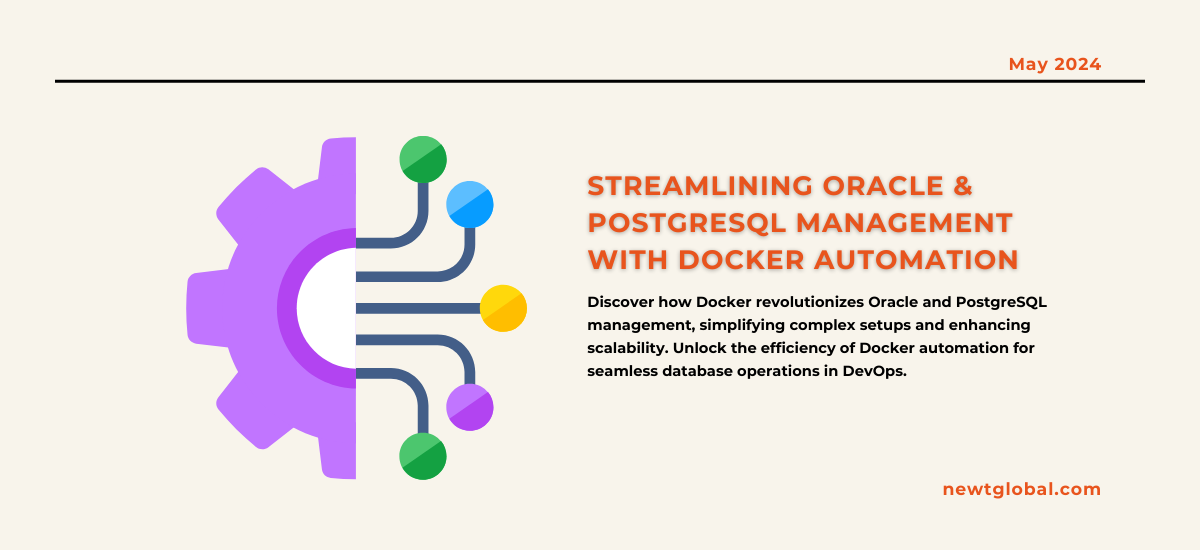
In the world of DevOps, making database management efficient and reliable is like searching for a precious treasure. Docker comes into play like a hero in this search, especially for handling big databases like Oracle and PostgreSQL. This blog takes you through how Docker can really change the game for managing Oracle and PostgreSQL databases, making things run smoother and more efficiently.
Containerization in Database Management
Docker has really changed the game when it comes to setting up and managing software by putting everything needed into containers. This means you can expect the same results no matter where you run your container. It’s a big deal for managing databases because it makes things more flexible and allows for growth without the usual headaches.
Docker for Oracle and PostgreSQL
Oracle and PostgreSQL are big names in databases because they’re powerful and can handle a lot of data. However, they can be tricky to manage because of their complex setups. Docker simplifies this, making it much easier to manage these databases, which is a huge win for anyone in DevOps.
Oracle Deployments with Docker
Setting up an Oracle database can be complex, but Docker can automate a lot of the steps, making it less likely for mistakes to happen.
-
- Oracle Docker Images: Start by creating a Dockerfile that sets up Oracle the way you need it. Use the official Oracle images as a foundation and adjust them to fit your needs.
-
- Data Persistence: Use Docker volumes to keep your data safe even when you update or restart your containers. You can use environment variables to easily set up your Oracle database.
-
- Automated Deployments: Once you have your Docker setup ready, use Docker Compose or Kubernetes to get everything running. These tools make it easy to manage your Oracle database, letting you scale up or down as needed.
PostgreSQL Deployments with Docker
PostgreSQL is loved for being open-source and flexible. Docker makes managing PostgreSQL even better by adding efficiency and the ability to scale.
-
- Creating PostgreSQL Docker Images: Begin with the official PostgreSQL images and customize them with your own Dockerfile to fit your needs.
-
- Setting Up Your Database: Use Docker’s environment variables to customize your PostgreSQL setup, like setting database names, user names, and passwords.
-
- Scaling Your Database: Use Docker Compose or Kubernetes to manage your PostgreSQL databases easily. They help you scale your services and keep your databases running smoothly.
Best Practices for Docker Deployments
-
- Keep Your Dockerfiles Safe: Make sure to save your Dockerfiles and docker-compose.yml files in version control. This keeps track of any changes and helps keep everything running smoothly.
-
- Update Your Docker Images: Regularly update your Docker images to get the latest features and security updates.
-
- Monitor Your Containers: Keep an eye on how your containers are performing. Make sure they’re running efficiently and not using more resources than they should.
Epilogue
Using Docker to manage Oracle and PostgreSQL databases is a game-changer. It brings efficiency, scalability, and reliability to database management in DevOps. By getting on board with Docker, managing databases becomes much easier, opening up new possibilities for growth and stability. As we dive deeper into the world of containerization, Docker remains a key tool in making database management smoother and more efficient.
If you’re looking to take your database management to the next level, especially if migrating Oracle DB to a cloud-native PostgreSQL setup is on your radar, then you’ll want to know about Newt Global DMAP. It’s a top-tier product designed to make the transition to cloud-native PostgreSQL not just possible but faster, better, and more cost-effective.
For more information on how Newt Global DMAP can transform your database migration projects, visit newtglobal.com. If you have questions or need to get in touch with us, please reach out at marketing@newtglobalcorp.com. Don’t miss this opportunity to streamline your database management and migration projects with the expertise of Newt Global.
